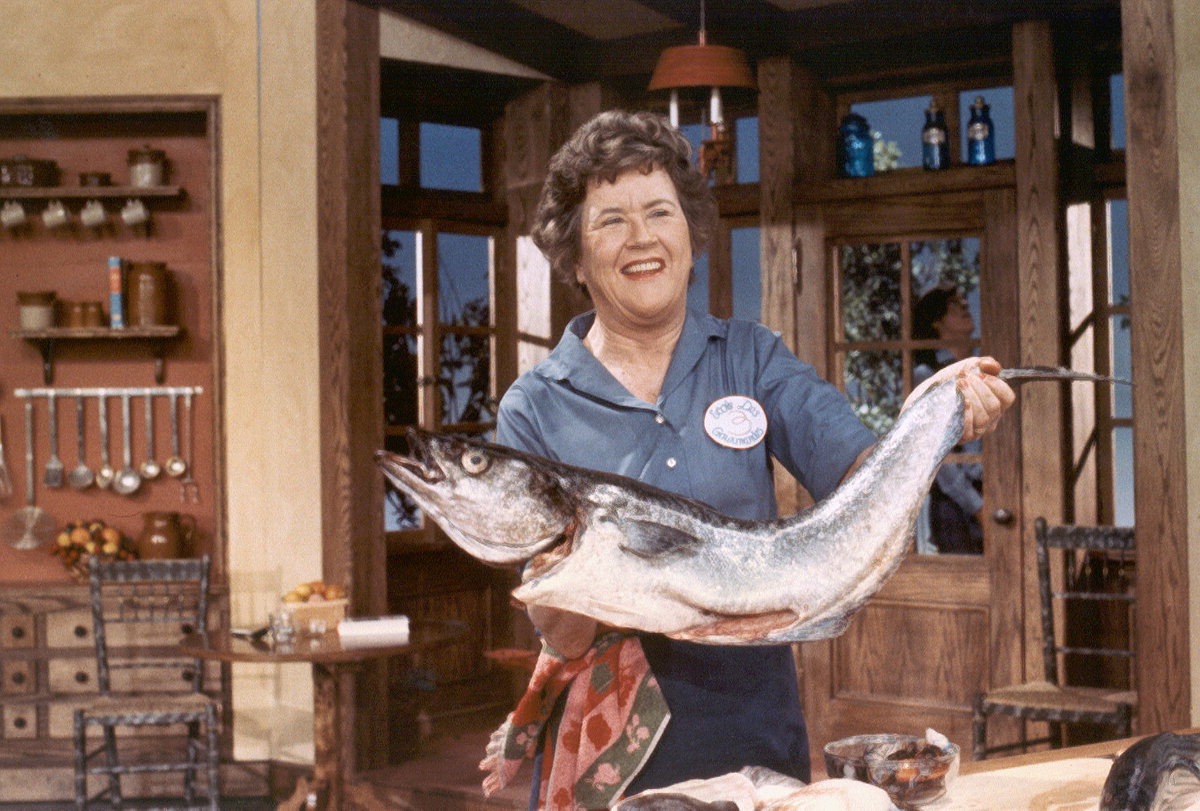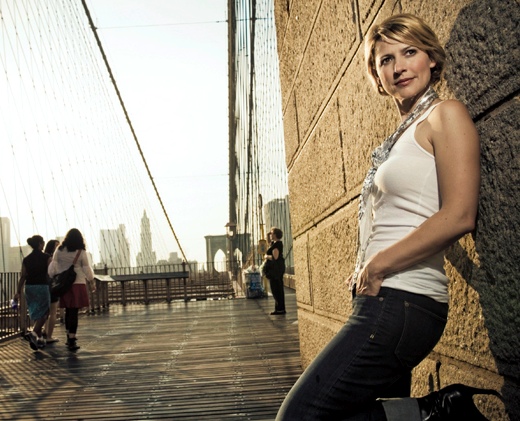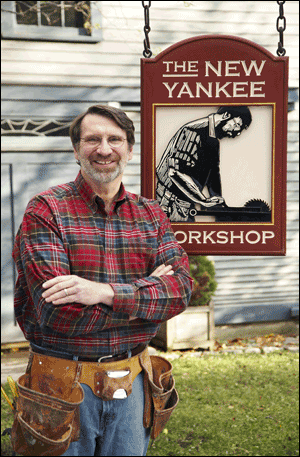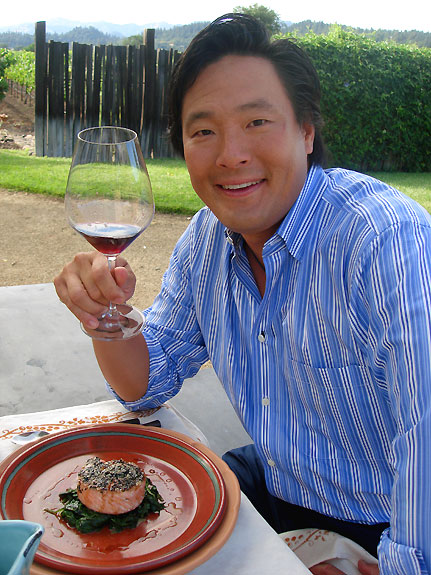[Bianculli here: Tom Brinkmoeller, for his latest column, reverted to his old print reporter instincts, and conducted interviews as well as delivered his own opinion. The topic: TV's food shows. And while I'll agree to disagree with him about Gordon Ramsay, whose shows I find immensely entertaining, he's really onto something about the respective informative values of certain shows.
Here's Tom's full report...]

Without Public Television, We All Would Be Drowning in EVOO
If you understand the difference between a really good museum and a circus, you no doubt can see the huge differences between the prototype cooking, how-to and travel series on public television and the badly executed rip-offs that populate cable's Food Network, HGTV, Travel Channel and their lesser sycophant cable brethren.
One is art. The other is clowns and animals.
Some comparisons: Watch any Julia Child or Jacques Pepin series, or America's Test Kitchen, or Gourmet's Diary of a Foodie, or almost any other public broadcasting cooking show (the wonderful reality is there are so many), and you actually learn how to cook. You're entertained, but it's secondary to making the half-hour a worthwhile investment. It's intelligent, clearly presented and non-gimmicky. There's an art involved, and you get to watch.
Then watch any Food Network show hosted by Rachael Ray, Paula Deen, Sandra Lee or even Ina Garten or Giada De Laurentiis and if you're interested in learning to cook, you have to question your investment. Learning too often gets put far behind meaningless story lines, empty glitz, cross-promotion and product placement.
Could it be that these shows get sprayed with PAM before airing, so nothing too important sticks to them? At least they are better than the truly awful food-competition shows, which would seem to attract people who like to watch crying contestants get voted off the set and those viewers who will sit through a thoroughly boring hour to see if a cake falls over or apart before it's judged.
A few more comparisons -- in case you're not yet convinced -- before a little analysis. Compare public TV's Rick Steves, Globe Trekker or Rudy Maxa shows with those hosted by:

-- Samantha Brown (a decent travel journalist trapped inside a network that appears to have minimal ethics when it comes to a business buying its way onto the show).
-- Anthony Bourdain (perhaps the angriest man on television after Regis Philbin, but decidedly less professional or entertaining).
-- Andrew Zimmern (a man who has gotten himself airtime simply by showing he'll eat any insect or innard -- a quality my wife's childhood dog had, but it didn't win him a series).
Finally, see if you can discover the quality thread of This Old House and The New Yankee Workshop in commercial knockoffs Carter Can or Design on a Dime. Are the production standards similar in The Victory Garden and Desperate Landscapes?
Of course, there is no comparison. PBS invented and has perfected TV Worth Watching in these categories. Over the years, cable has largely acted as an anti-alchemist, repeatedly turning gold into lead. Most unjust is that these high-quality originals have to work like crazy for underwriting. Meanwhile, the propensity to do anything to attract higher advertising rates helps the commercial bandits pay bills and makes people like EVOO peddler Rachael Ray wealthy. (The words "extra virgin olive oil" may be too hard for her to say.)
How does this sit with the inventors of these genres? Russell Morash produced every Julia Child series from her television start in the early '60s, and invented This Old House, Ask This Old House, The New Yankee Workshop and The Victory Garden. He cut back his busy schedule in 2004, handing over control of all but The New Yankee Workshop. Separation hasn't lessened his interest, though. Standards for shows that have taken his concepts commercial, he says, have dropped "beyond zero."
On his PBS shows, hosts also have been collaborators, shaping the programming and raising quality levels. Morash says Norm Abram and French Chef Julia Child have shared the quality of thoroughly knowing the subject before the shooting starts -- a quality not deemed necessaryhosts are chosen for looks and how they will on the commercial networks. Too often, Morash says, appeal to a demographic target, and program concepts are born in marketers' minds.
on the commercial networks. Too often, Morash says, appeal to a demographic target, and program concepts are born in marketers' minds.
"Julia did not have all the chromium, but she could cook the hell out of a show," he says. "She had another disarming characteristic. She was very smart, well-schooled. She knew what she was talking about, and she kept that up her entire life.
"Norm is the same way. He reads about and understands the entire technique before he does something he's never done before."
These qualities don't show themselves on the copies of the originals. Be it a how-to fix program that skips over the details of a project to fit it into a half-hour package or a cooking show that's more drama than substance, a program is built to fit a concept.
Morash says he recently watched an episode of Hell's Kitchen in which star Gordon Ramsay's main purpose seemed to be "to insult and abuse these youngsters." Morash's wife, Marian, watched with him. She was the cooking expert on The Victory Garden and also worked for many years in the kitchen of an East Coast five-star seafood restaurant. More than their astonishment at the chef's theatrical demeanor ("beyond abusive"), they couldn't believe Ramsay would charge the contestants with creating a signature dish in 45 minutes. Morash's wife pointed out that many truly talented chefs consider it an achievement if they can create a true "signature dish" over a 45-year career.
The commercial networks' appetite for the wrapping paper over the content is nothing new. Morash accompanied Ms. Child many years ago to a cooking appearance on Good Morning America. Seventy-seven seconds into the segment, a network executive in the control room turned to Morash and said, "This is really boring!"

Though they've seen their masterpieces counterfeited into the equivalent of velvet paintings for sale on a roadside lot, the good guys haven't given up on their dream of producing TV Worth Watching. Laurie Donnelly has been working in public television for 34 years and, as the WGBH executive producer of lifestyle programming, oversees the programs Morash created, as well as Simply Ming and Gourmet's Diary of a Foodie. She says these types of programs will continue to thrive as long they're "presented in a way that's not intimidating and not condescending" by "experts who have a passion for what they do."
Finding underwriters, she says, "is always a challenge." But experience has shown her that there's always "the right fit" for programming that makes high quality and accessibility the most important ingredients.
Just imagine how far television would sink without those kinds of principles.
--

Tom writes: For a number of years, Tom Brinkmoeller was paid to watch and write about television. That seemingly ideal situation can't match his current one -- watching only what he enjoys, not being held hostage by a paycheck, and not having to steer a TV story through editors who think watching television impairs the brain as well as social status.